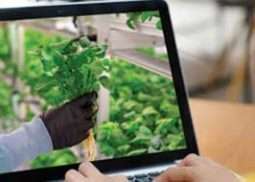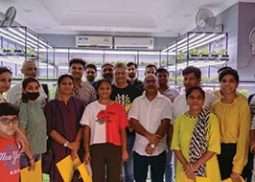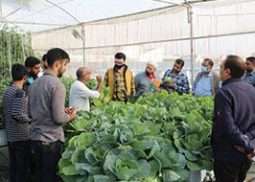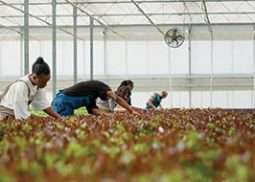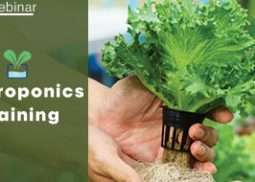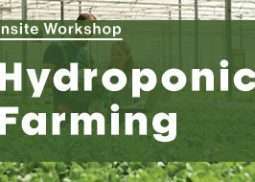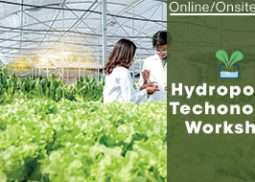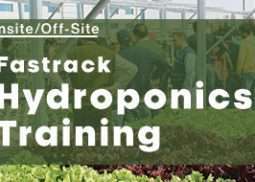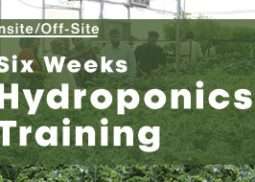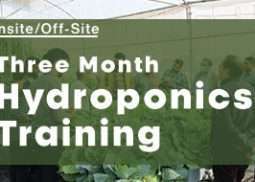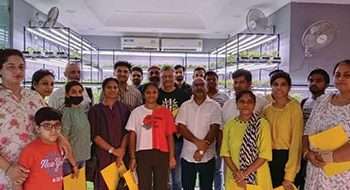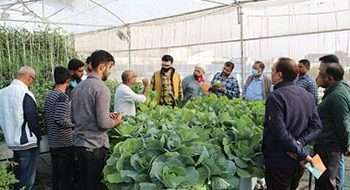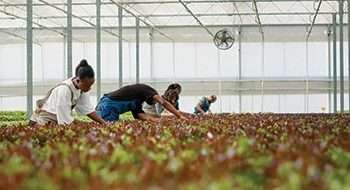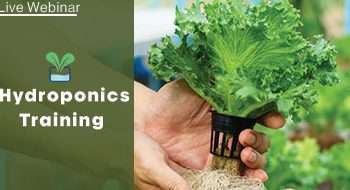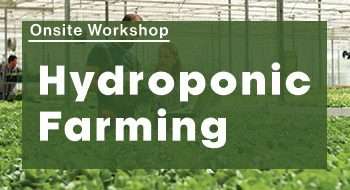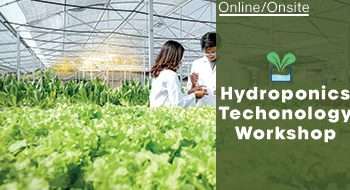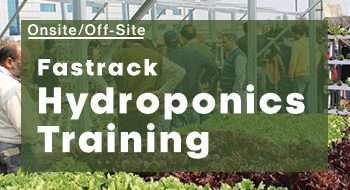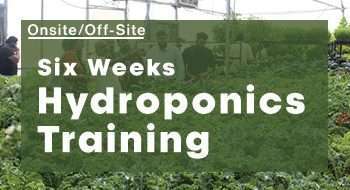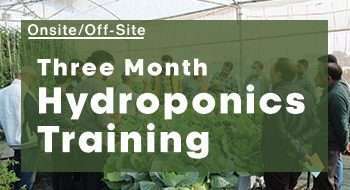3 Months Comprehensive Course on Hydroponics Technology
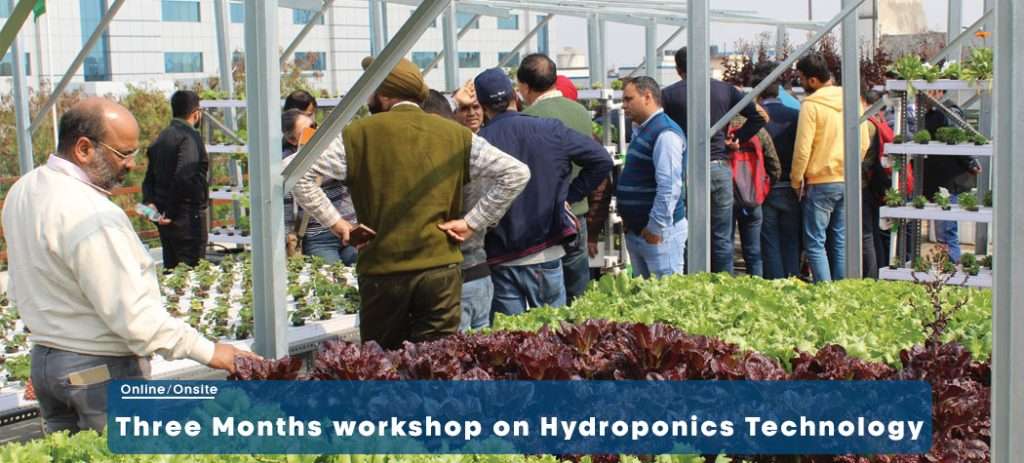
Key Learning Goals
Embark on a transformative journey into the world of hydroponics with our intensive 3-months course. Designed for enthusiasts, entrepreneurs, and aspiring professionals alike, this program offers a deep dive into hydroponic technology, equipping you with the expertise to thrive in this rapidly growing field.
- Introduction To Hydroponics,
- Plant Science Plant Growth Requirements
- Hydroponics Systems
- Hydroponics Crops
- Hydroponics Nutrient Management
- Hydroponics Automation Control
- Agronomy, Pest diseases Management
- Hydroponics Business planning
- Question Answers Session
- Marketing and Sales Strategies
Three-Months Workshops Agenda
- Introduction to Hydroponics Technology
- Exploring the benefits and advantages of soil-less cultivation.
- Introduction to basic hydroponic systems.
- Understanding the commercial potential of hydroponic farming.
- Exploring different hydroponic systems suited for commercial-scale operations.
- Identifying profitable crops and market trends.
- Exploring different hydroponic systems: Deep water culture, nutrient film technique, and vertical farming setups
- Setting up your hydroponic space: Selecting systems, growing mediums, and essential equipment.
- Optimizing system layout for space efficiency and productivity
- Designing and building various hydroponic Systems
- The role of nutrients in hydroponic plant growth.
- Understanding the importance of water quality.
- Understanding pH, EC/TDS
- Monitoring pH and EC levels for optimal plant health and preventing nutrient deficiencies.
- Formulating and adjusting nutrient solutions.
- Common Nutrient ranges in Hydroponics
- Various Nutrient Recipes
- Importance of temperature, humidity, and light control
- Introduction to greenhouse technology and its applications in hydroponics
- Managing environmental parameters for optimal plant growth
- Understanding the benefits of greenhouse cultivation.
- Exploring different types of greenhouses and structures.
- Overview of environmental factors affecting plant growth.
- Planning for optimal light, temperature, humidity, and ventilation control.
- Implementing climate control systems for precise regulation of temperature, humidity, and airflow.
- Monitoring and managing environmental parameters for optimal plant health and growth.
- Explore the wide range of crops suitable for hydroponic cultivation and learn best practices for maximizing yields.
- Selecting suitable crops for hydroponic cultivation.
- Planting, transplanting, and caring for hydroponic plants.
- Nutrient management strategies for high-yield production.
- Practicing advanced cultivation techniques for maximum yields
- Identifying common pests and diseases in greenhouse environments.
- Implementing integrated pest management (IPM) strategies.
- Exploring emerging trends and technologies in automation.
- Understanding the benefits of automation for hydroponic Farming.
- Overview of available technologies and their applications.
- Introduction to automated nutrient dosing and mixing systems.
- Hands-on demonstration: Setting up an automated nutrient delivery system.
- Programming and scheduling irrigation cycles for optimal plant health.
- Controlling temperature, humidity, CO2 levels, and airflow.
- Utilizing smart technology for remote monitoring and control.
- Strategies for reducing manual labor and increasing operational efficiency.
- Market analysis and identifying target customers
- Developing a hydroponic farming business plan
- Legal and regulatory considerations for hydroponic farms
- Cost estimation for setting up a hydroponic farm
- Revenue projections and financial forecasting
- Managing expenses and optimizing profitability
- Explore our state-of-the-art hydroponic greenhouse and learn how we cultivate fresh, nutritious produce year-round using cutting-edge technology.
- Roll up your sleeves and get involved in interactive workshops led by our experienced farm team.
- Learn how to plant seedlings, manage nutrient solutions, and maintain hydroponic systems for optimal plant growth.
- Engage with our knowledgeable team members during a Q&A session where you can ask questions, share ideas, and learn from their firsthand experiences in sustainable farming.
- Witness the beauty of soilless cultivation and discover the advantages of hydroponics in conserving water, maximizing space, and minimizing environmental impact.
- The Importance of Harvest and Post-Harvest Management
- Understanding Harvested Crop Physiology: Ripening of fruit,
Respiration, How and when to harvest, How to prepare salad
mixes from harvested hydroponic produce - Harvesting and Grading Vegetables
- What is Considered Within a Grading Standard?
- Harvesting Cut Flowers: Stage of growth, Shelf life, Postharvest treatments, grading standards for cut flowers,
Conditioning cut flowers for market, Packaging - Marketing: Send to markets, Wholesalers, Supermarkets,
Local retailers, Export, Contract
- Branding and promoting your hydroponic produce
- Distribution channels and sales outlets
- Customer relationship management and feedback mechanisms
What to Expect From this Three-Months Workshops ?
Our hydroponics Workshop is a Three-Months greenhouse and hydroponics training program that incorporates teaching and demonstration to provide participants with a clear understanding of controlled environment farming and hydroponics systems. This training program includes classroom presentations as well as the opportunity to become familiar with hydroponic growing systems in a hydroponics experience centre. Participants will learn about how to grow vine and leafy in hydroponic systems.
Real-Time Real Farm visit
Detailed In-Sights for Starting Hydroponics Business
Practical Session
Vendor Details for procurement of Hydroponic related products
Certification of Participation
Expert Mentorship and Networking with Professionals
Who Can Attend The Course?
Beginners, Hobbyists, progressive growers, Agripreneurs and hydroponics consultants of any age with a keen interest in New-Age Farming are most welcome in the Advance Hydroponic Technology Course
Agri-Entrepreneurs who want to start an agribusiness.
Hydroponics Growers looking for expert advice on business expansion.
Home Gardeners: Anyone with balcony or terrace & wants to grow quality vegetables
Ideal for Beginners who want to learn about hydroponics/soil less farming & understand it’s business prospects in India.
About The Course
Mode/Duration
Three-Months
Weekend
onsite/online
Learning Based outcomes:
Get hands-on experience in hydroponics farming with an understanding of the system,Nutrient management, pest & disease in hydroponics, Cultivation farming & understand it’s business prospects in India.
Trainer:
They are delivered by a senior hydroponics professional having extensive experience of hydroponics and greenhouse farming,These practitioners are also impanelled as subject matter experts with InHydro.
Content:
Great Content on Hydroponics farming including courseware (PPT/PDF), data, case studies articles books videos, resource library & related more.
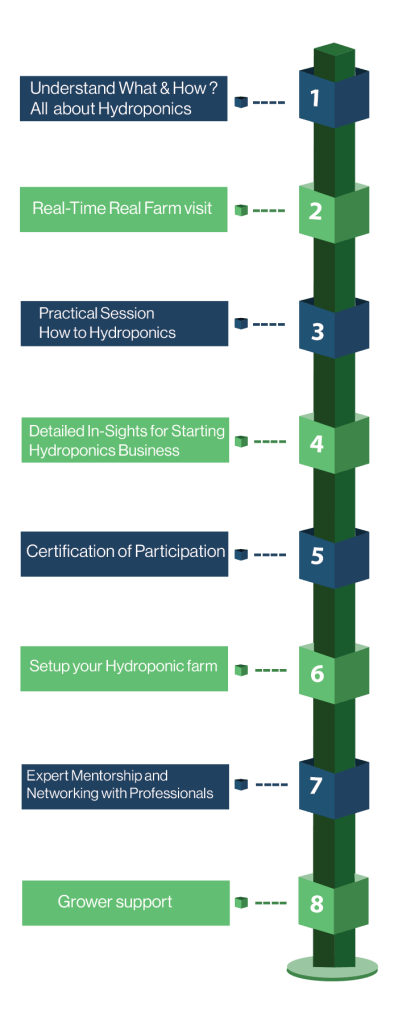
Frequently Asked Questions
yes it is chargeable
It’s a pure in-house Program
No, We will deliver everything from scratch with a Real-Time Hydroponic Farm environment.
Yes, Keeping in Mind that Entrepreneur and Professional are also joining this session the detailed case studies will be discussed and Scope in India for Hydroponic business will be shared.
Yes, You all are cordially invited to visit our full-functioning Hydroponic Farms in Sector -59 Noida [ U.P ]
During this workshop you will have complete in-sight from scratch to start the AgriTech business, RoI Model, Challenges and Vendor details that may suffice the need to any start-up or Mid-Level business need.
No, Anyone can attend, who wishes to excel in the field of Hydroponic. We wil discuss Growing Methodology, Challenges, Business Models, Type of Hydroponic, type of produce which can be grown using this and many more
Yes, e-Copy of Certificate will be mailed to registered email IDs
Yes, You can visit our e-Market Place www.FarmsBazaar.com for required products.
InHydro Hydroponics brings sustainable technology based farming methods to agripreneurs. We have integrated Agricultural Sciences with the latest technology to produce healthy food with high nutritional value, free from harmful pesticides, herbicides, and fungicides. It’s done with incredible variety, with many different plants growing vertically in only a square foot of floor space.
Register Here
All Courses
Process of Participation
Training Program Includes:
Training Gallery
All Courses
-
Online Program
Online Hydroponics Program Learning courses involve a combination of live, interactive sessions over the Internet with a professional instructor, set readings, assignments, and dedicated Learning Support.
21/11/2022 Read more -
Classroom Program
The classroom hydroponics programme can take a number of ways. Therefore, depending on the kind of programme you want, what to expect varies greatly.
21/11/2022 Read more -
Corporate Program
Inhydro’s Corporate training, Also known as Corporate Education or more recently Workplace Learning, is a system of activities designed to educate employees.
21/11/2022 Read more -
Internship Program
A Unique Internship Model with hands-on learning and Job-Opportunity for each graduating candidates, it came to the InHydro notice that though there are.
21/11/2022 Read more -
Live Hydroponic Webinar
InHydro webinar on Advanced Hydroponics Technology is a One Day (3 Hour) hydroponics awareness training program. The main objective of this webinar is to focus on the growing of plants without soil.
21/11/2022 Read more -
One Day Hydroponics Workshop
Our hydroponics workshop is a one-day greenhouse and hydroponics training program that incorporates teaching and demonstration to provide participants with a clear understanding of control.
21/11/2022 Read more -
Two Days Hydroponics Workshop
Our hydroponics workshop is a two-day greenhouse and hydroponics training program that incorporates teaching and demonstration to provide participants with a clear understanding of control.
21/11/2022 Read more -
One Week Workshop
Our hydroponics Workshop is a Nine-days greenhouse and hydroponics training program that incorporates teaching and demonstration to provide participants with a clear understanding of control.
21/11/2022 Read more -
Six Weeks Program
Our hydroponics Workshop is a Six-Weeks greenhouse and hydroponics training program that incorporates teaching and demonstration to provide participants with a clear understanding of control.
21/11/2022 Read more -
Three Months Program
Our hydroponics Workshop is a Three-Months greenhouse and hydroponics training program that incorporates teaching and demonstration to provide participants with a clear understanding of controlled.
21/11/2022 Read more

